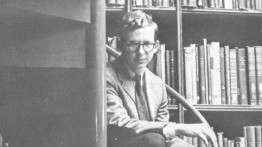An Interview with Ernest Seglie PHY ‘67
After the reunion, Ernest Seglie answered questions about his time at Cooper. The interview illustrates the remarkable experiences and accomplishments of the Class of 1967.
What is your background, and what brought you to Cooper Union?
I am from New York and lived all my life in Queens, until I graduated Cooper Union. My father put one constraint on my college search: “You can go to college anywhere you want, provided it doesn’t cost me anything.” I never found out if he was joking or laying down the law, but he knew about Cooper Union, and was ecstatic when I got in. He was in construction and hoped that I would become a civil engineer and go into business with him.
Why did you choose the Physics program?
The entrance exam for Cooper Union required that we identify an area of interest. I chose Civil Engineering, but early in my first term, two things happened: 1) I realized that civil engineering was not for me, and 2) Cooper Union decided to offer a major in Physics.
How were your experiences in the Physics program unique, and what helped your class develop such a close bond?
I believe that the class had a common experience: we all needed the education that Cooper provided, but within our first six months at Cooper, we knew that engineering would not satisfy us. The notion of a science orientation was more appealing. It was new, it was an adventure, and it was unknown. The curriculum kept changing. Requirements kept growing. We all shared a willingness to achieve something new.
What is one experience that stands out from your time at Cooper?
From an historic point of view, the most significant experience was living through the assassination of President Kennedy. The class had arranged to go to Green Camp that weekend, so we were there together during that time. We were insulated from the TV and radio coverage, and we had to face the tragedy privately. That meant we dealt with it actively instead of passively watching TV and listening to others telling us how we should feel.
After the weekend, when we returned to class, there was a convocation in the Great Hall. The speaker read from the Meditations of Marcus Aurelius, the stoic philosopher and emperor of Rome. In a time before the need for grief counseling became generally recognized, the teachers at Cooper knew we needed support.
Almost every passage has that stoic courage all of us need in time of grief:
Let your actions be done with dignity, gravity, humanity, freedom and justice; let every action be done as though it were your last. Have neither insincerity nor self-love.
How did your experiences at Cooper prepare you for your career?
This goes back to the class characteristic of willingness to try new things. Five of us from the class went to the University of Massachusetts PhD program in Physics. It was a growing department and offered the highest stipend in the country in order to attract good students. On the other hand, its reputation was not established, so it was a gamble.
Eventually, I worked for the Institute for Defense Analyses. When they formed a new Division to do Operational Evaluation of new Defense systems, I entered that Division. When Congress established a Director of Operational Test and Evaluation within the office of the Secretary of Defense, I become the Director’s first Science Advisor. So my career was always heading toward the new.
There is probably one other experience that has to do with the nature of Physics. Physicists have an unusual mode of operating. They are not content solving the same problem over and over. They typically look for a problem for which they do not know the solution, and then proceed to find one. The confidence to do that requires some practice, and we got that studying Physics at Cooper Union.
What was it like returning to Cooper with your classmates?
My first impression was that the building where we had spent all that time [51 Astor Place] was gone, replaced by a big hole in the ground.
We had all agreed to meet at McSorley’s, a spot everyone knew. The place was so packed on Saturday afternoon that we could not all get in. McSorley’s has changed, since they now allow women in!
The new classroom building [41 Cooper Square] is dramatic. It has curves everywhere, “see through” stairs, and special lighting. Of course, typical of our class, one member had to explore the lights in an exhibit space, and he noted that the switches were all on the factory default settlings! Inquiring minds want to know.
Of course the big surprise was seeing all the classmates. There can be a lot of change in 45 years, but basic personality stays the same. We all got on rather well. As a classmate noted: We were all good friends in college; it is no surprise that we could get along so well after all these years.





